language learnability
语言习得

• 错误分析区分了错误(error)和失误 (mistake)。 • 错误是学习者语言能力不足造成的,出 现规律,学习者无法进行自我纠正。 • 失误是学习者有能力避免但因为粗心等 原因造成的,学习者能自我纠正。
• 错误的类型主要有: • 添加(additions):句中出现不必要的 成分,如Does he can dance? • 省略(omissions):句中缺少必不可少 的成分,如I happy。 • 顺序错误(misorderings):句中成分位 置错误,如I to the cinema came。
一、第一语言习得
• First language acquisition • 语言学家提出了很多假说来解释第一语 言习得,其中比较著名的是行为主义论 或先天主义论。
1.行为主义论
• Behaviourist view. • 行为主义论认为语言的习得像人的其他行 为一样是通过刺激——反映过程进行模仿, 进而形成习惯的。具体而言,就是学习者 不断模仿、操练正确的语言形式直至形成 习惯。我们常用的句型练习就是受到这种 模式的影响而提出的。
《教程》p. 143
• Generally speaking, there are mainly three different theories concerning how language is learned, namely the behaviorist, the innatist, the interactionist view.
• 考点:理解术语的含义,识别基本的错 误类型。
阅读
• • p.143-157 • p.159-173
练习
• 《人文知识》p. 175-177。
4. 输入假说 (input hypothesis)
二语习得中的偏误分析
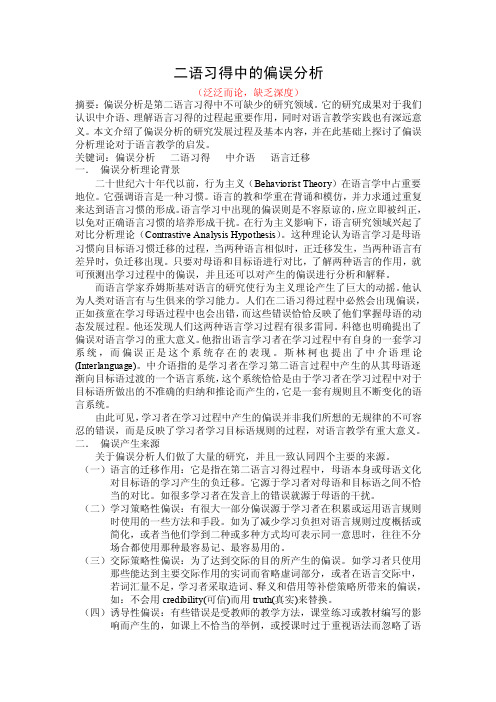
二语习得中的偏误分析(泛泛而论,缺乏深度)摘要:偏误分析是第二语言习得中不可缺少的研究领域。
它的研究成果对于我们认识中介语、理解语言习得的过程起重要作用,同时对语言教学实践也有深远意义。
本文介绍了偏误分析的研究发展过程及基本内容,并在此基础上探讨了偏误分析理论对于语言教学的启发。
关键词:偏误分析二语习得中介语语言迁移一.偏误分析理论背景二十世纪六十年代以前,行为主义(Behaviorist Theory)在语言学中占重要地位。
它强调语言是一种习惯。
语言的教和学重在背诵和模仿,并力求通过重复来达到语言习惯的形成。
语言学习中出现的偏误则是不容原谅的,应立即被纠正,以免对正确语言习惯的培养形成干扰。
在行为主义影响下,语言研究领域兴起了对比分析理论(Contrastive Analysis Hypothesis)。
这种理论认为语言学习是母语习惯向目标语习惯迁移的过程,当两种语言相似时,正迁移发生,当两种语言有差异时,负迁移出现。
只要对母语和目标语进行对比,了解两种语言的作用,就可预测出学习过程中的偏误,并且还可以对产生的偏误进行分析和解释。
而语言学家乔姆斯基对语言的研究使行为主义理论产生了巨大的动摇。
他认为人类对语言有与生俱来的学习能力。
人们在二语习得过程中必然会出现偏误,正如孩童在学习母语过程中也会出错,而这些错误恰恰反映了他们掌握母语的动态发展过程。
他还发现人们这两种语言学习过程有很多雷同。
科德也明确提出了偏误对语言学习的重大意义。
他指出语言学习者在学习过程中有自身的一套学习系统,而偏误正是这个系统存在的表现。
斯林柯也提出了中介语理论(Interlanguage)。
中介语指的是学习者在学习第二语言过程中产生的从其母语逐渐向目标语过渡的一个语言系统,这个系统恰恰是由于学习者在学习过程中对于目标语所做出的不准确的归纳和推论而产生的,它是一套有规则且不断变化的语言系统。
由此可见,学习者在学习过程中产生的偏误并非我们所想的无规律的不可容忍的错误,而是反映了学习者学习目标语规则的过程,对语言教学有重大意义。
样成为一个成功的语音学习者作文
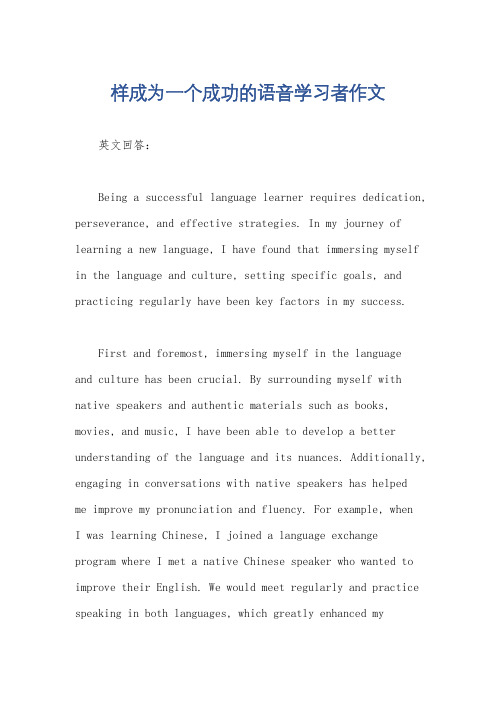
样成为一个成功的语音学习者作文英文回答:Being a successful language learner requires dedication, perseverance, and effective strategies. In my journey of learning a new language, I have found that immersing myself in the language and culture, setting specific goals, and practicing regularly have been key factors in my success.First and foremost, immersing myself in the languageand culture has been crucial. By surrounding myself with native speakers and authentic materials such as books, movies, and music, I have been able to develop a better understanding of the language and its nuances. Additionally, engaging in conversations with native speakers has helped me improve my pronunciation and fluency. For example, whenI was learning Chinese, I joined a language exchange program where I met a native Chinese speaker who wanted to improve their English. We would meet regularly and practice speaking in both languages, which greatly enhanced mylanguage skills.Setting specific goals has also played a significant role in my language learning journey. By setting clear and achievable goals, I have been able to stay motivated and focused. For instance, when I started learning French, my goal was to be able to have a basic conversation with a native speaker within six months. I broke down this goal into smaller milestones, such as learning 100 new vocabulary words every week and practicing speaking for at least 30 minutes every day. This goal-oriented approach kept me on track and helped me progress steadily.Regular practice is another key aspect of becoming a successful language learner. Consistency is key, and I have made it a habit to practice the language every day. This includes activities such as listening to podcasts, watching movies or TV shows in the target language, and engaging in conversation with native speakers. By incorporating language learning into my daily routine, I have been able to make steady progress and retain what I have learned. For example, when learning Spanish, I would listen to Spanishpodcasts during my daily commute and practice speaking with a language partner over video calls in the evenings.中文回答:作为一个成功的语言学习者,需要付出努力、坚持不懈,并采用有效的学习策略。
语言学习的价值英语作文150字
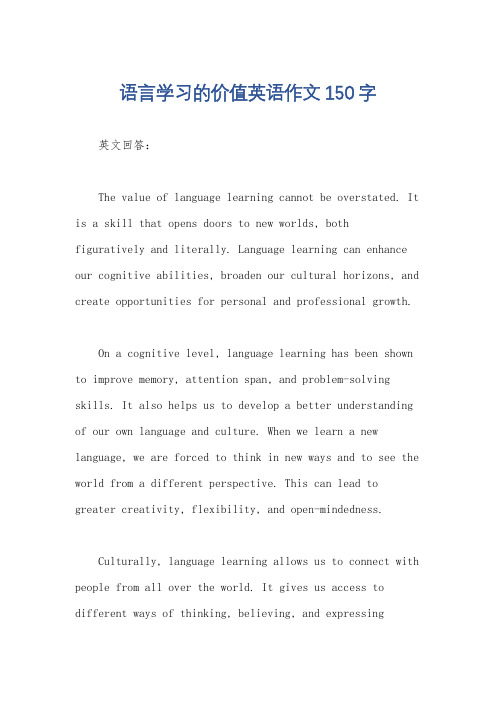
语言学习的价值英语作文150字英文回答:The value of language learning cannot be overstated. It is a skill that opens doors to new worlds, bothfiguratively and literally. Language learning can enhance our cognitive abilities, broaden our cultural horizons, and create opportunities for personal and professional growth.On a cognitive level, language learning has been shown to improve memory, attention span, and problem-solving skills. It also helps us to develop a better understanding of our own language and culture. When we learn a new language, we are forced to think in new ways and to see the world from a different perspective. This can lead to greater creativity, flexibility, and open-mindedness.Culturally, language learning allows us to connect with people from all over the world. It gives us access to different ways of thinking, believing, and expressingourselves. Through language, we can learn about other cultures, appreciate their traditions, and build bridges between different communities.Professionally, language learning can open up a world of opportunities. In today's globalized economy, employers are increasingly seeking employees who can communicate effectively in multiple languages. Language skills can give you a competitive edge in the job market and help you to advance your career.In short, language learning is a valuable skill that can benefit us in countless ways. It is an investment in our future, both personally and professionally.中文回答:语言学习的价值不可估量,它是一项开启新世界大门的技能,无论是从字面上还是比喻上来说。
Good Language Learners

3. 不受第二语言知识的欠缺所约束(being uninhibited),不怕犯错误,不怕出丑(willing to appear foolish);
4. 不仅注重交际,也注重语言形式(attending to form);
Being active does not necessarily mean engaging in language production.
“Silent Speakers”
4. An Awareness of the Learning Process
Successful learners are thoughtful and aware of themselves in relation to the learning process.
other’s speech
2. A Concern for Communication (Functional Practice)
Huang and Van Naerson (1985) Abraham and Vann’s (1987) Lemon’s (1989) The ability to switch to and fro in attending to
Good Language Learner
Part 1
对成功语言学习者的定义
成功语言学习者的研究背景
对成功语言学习者的研究
成功的语言学习者与不成功的语言学习者的对 比研究
1.1 什么叫成功语言学习者?
1. 语言是指母语还是二语或外语? 2. 什么才是“成功”? 3. 语言学习者仅局限于专业语言学习者吗?
Reiss (1983)
英语教育中的语言学理论
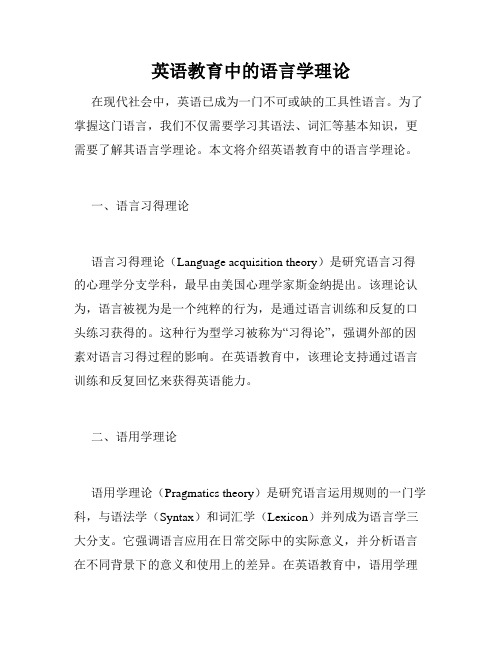
英语教育中的语言学理论在现代社会中,英语已成为一门不可或缺的工具性语言。
为了掌握这门语言,我们不仅需要学习其语法、词汇等基本知识,更需要了解其语言学理论。
本文将介绍英语教育中的语言学理论。
一、语言习得理论语言习得理论(Language acquisition theory)是研究语言习得的心理学分支学科,最早由美国心理学家斯金纳提出。
该理论认为,语言被视为是一个纯粹的行为,是通过语言训练和反复的口头练习获得的。
这种行为型学习被称为“习得论”,强调外部的因素对语言习得过程的影响。
在英语教育中,该理论支持通过语言训练和反复回忆来获得英语能力。
二、语用学理论语用学理论(Pragmatics theory)是研究语言运用规则的一门学科,与语法学(Syntax)和词汇学(Lexicon)并列成为语言学三大分支。
它强调语言应用在日常交际中的实际意义,并分析语言在不同背景下的意义和使用上的差异。
在英语教育中,语用学理论为学生了解英语在不同场合下的使用和语气、联想等方面提供了重要的指导。
三、认知语言学理论认知语言学理论(Cognitive Linguistics)是一种新兴的语言学派别,它探讨语言与思维之间的关系,研究语言知识的认知和构建方式。
该理论认为,语言的意义是由认知语言处理机制产生的,语言的规律来自于认知建构活动。
在英语教育中,认知语言学理论强调学习者将语言的概念与自己的认知结构进行联系,从而更好地理解和掌握语言。
四、社会语言学理论社会语言学理论(Sociolinguistics)分析语言在社会上的使用和使用者的社会环境的影响。
社会语言学理论强调文化和社会因素对语言使用的影响,并研究它们如何影响书面和口头语言的发展。
在英语教育中,社会语言学理论可以帮助学生了解不同文化背景和社会环境对语言的影响,更加深入地了解和运用语言。
总之,语言学理论可以为我们更好地理解和掌握英语提供帮助。
作为英语学习者,我们应该不断更新自己对语言学理论的知识,并将其运用到实际学习当中。
如何成为一个优秀的语言学者,英语作文

如何成为一个优秀的语言学者,英语作文(中英文版)To become an excellent linguist, one must adopt a multifaceted approach that encompasses a variety of skills and attitudes.Firstly, a genuine passion for languages is indispensable.This passion serves as the driving force that propels one to delve deep into the nuances and intricacies of languages.要想成为一个优秀的语言学者,首先需要具备的便是对语言学习的无限热情。
这种热情是推动你深入探索语言各种细节和复杂性的原动力。
Secondly, a good linguist should cultivate a habit of consistent exposure to the target language.This can be achieved through daily practice, reading literature, watching movies, and engaging in conversations with native speakers.其次,优秀的语言学者应当养成持续接触目标语言的的习惯。
这可以通过日常练习、阅读文学作品、观看电影以及与母语人士进行交流来实现。
Furthermore, a successful linguist possesses excellent listening and observation skills.Paying attention to the smallest details in pronunciation, grammar, and vocabulary usage can significantly enhance language proficiency.此外,成功的语言学者还必须具备卓越的听力和观察能力。
如何成为一个好的语言学习者英语作文

如何成为一个好的语言学习者英语作文Becoming a Successful Language LearnerLanguage learning can be a challenging but rewarding endeavor. Whether you are learning English or any other language, there are several key attributes and strategies that can help you become a successful language learner. In this essay, I will delve into some essential qualities and techniques that will assist you in becoming a proficient language learner. Remember, consistent practice and dedication are keys to success!Firstly, motivation plays a fundamental role in language learning. Setting clear goals and understanding the reasons behind your desire to learn a language can help you stay focused and committed. Whether you aim to improve your job prospects, communicate with people from different cultures, or explore new literature and media, having a strongmotivation will drive your efforts and keep you engaged throughout the learning process.Secondly, developing effective learning strategies is crucial. Every learner is unique, and it is essential to find methods that work best for you. Experiment with different techniques, such as flashcards, language exchange programs, listening to music or podcasts, watching movies or TV shows, and utilizing online resources. Reflect on what helps you retain information and adapt your learning strategies accordingly.Next, creating a supportive learning environment is vital. Surrounding yourself with opportunities to use the language you are learning can accelerate your progress. Engage with native speakers, either in person or through language exchange platforms, and seek out language immersion experiences. Additionally, joining online communities andforums dedicated to language learning can provide valuable support and resources.In addition to creating a supportive environment, consistency is key. Regular practice is essential to language acquisition. Set aside dedicated time each day or week to study and review your language materials. Establish a routine that works for you and stick to it. Consider setting achievable short-term goals to keep track of your progress and maintain your motivation.Furthermore, embracing and tolerating mistakes iscritical for growth as a language learner. Making errors is a natural part of the learning process, and rather than being discouraged by them, view them as opportunities for improvement. Be open to receiving feedback and corrections from native speakers or language instructors. Remember that making mistakes is an indication that you are pushingyourself and actively engaging with the language.Another aspect of becoming a successful language learner is being patient with yourself. Learning a new language takes time and effort. It is crucial to recognize that progress may not always be linear, and there will be plateaus along the way. Don't be discouraged by temporary setbacks or slower periods of improvement. Trust the process and keep pushing forward.Lastly, maintaining a positive mindset can greatly enhance your language-learning journey. Embrace the challenges and celebrate your achievements, no matter how small they may seem. Surround yourself with positivity and view language learning as an exciting and enriching experience rather than a daunting task. Remember that every step you take brings you closer to fluency.In conclusion, becoming a successful language learner requires motivation, effective learning strategies, a supportive environment, consistency, embracing mistakes,patience, and a positive mindset. By embodying these qualities and implementing these techniques, you can enhance your language learning experience and achieve proficiency in your target language. Remember, language learning is a journey, so enjoy the process and celebrate your accomplishments along the way.。
英语学科核心素养
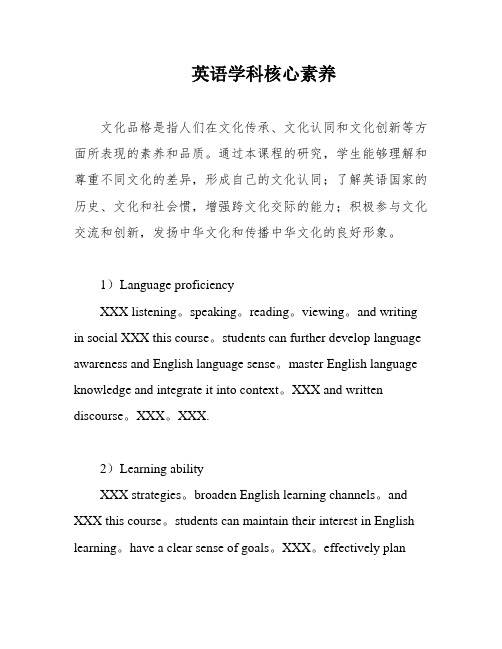
英语学科核心素养文化品格是指人们在文化传承、文化认同和文化创新等方面所表现的素养和品质。
通过本课程的研究,学生能够理解和尊重不同文化的差异,形成自己的文化认同;了解英语国家的历史、文化和社会惯,增强跨文化交际的能力;积极参与文化交流和创新,发扬中华文化和传播中华文化的良好形象。
1)Language proficiencyXXX listening。
speaking。
reading。
viewing。
and writing in social XXX this course。
students can further develop language awareness and English language sense。
master English language knowledge and integrate it into context。
XXX and written discourse。
XXX。
XXX.2)Learning abilityXXX strategies。
broaden English learning channels。
and XXX this course。
students can maintain their interest in English learning。
have a clear sense of goals。
XXX。
effectively planlearning time and tasks。
choose appropriate strategies and methods。
monitor。
reflect。
adjust。
and XXX.3)Thinking qualityXXX thinking。
reflecting the level and characteristics of logical。
critical。
and XXX this course。
语言学习的价值英语作文

语言学习的价值英语作文English: Language learning is incredibly valuable for a multitude of reasons. Firstly, it opens up new opportunities for communication and connection with people from different cultures and backgrounds. Being able to speak another language allows you to engage in meaningful conversations, build relationships, and gain a deeper understanding of different perspectives. Additionally, learning a new language can enhance cognitive abilities such as critical thinking, problem-solving, and creativity. It challenges the brain to think in different ways and improves overall brain function. Moreover, language learning is essential for personal and professional growth. Being proficient in more than one language can significantly boost your career prospects and open up possibilities for international job opportunities. It also promotes cultural awareness and appreciation, fostering empathy and understanding towards others. Overall, the value of language learning cannot be understated as it enriches our lives in countless ways.中文翻译: 语言学习具有极其宝贵的价值,原因多种多样。
英语教学法简答题及答案
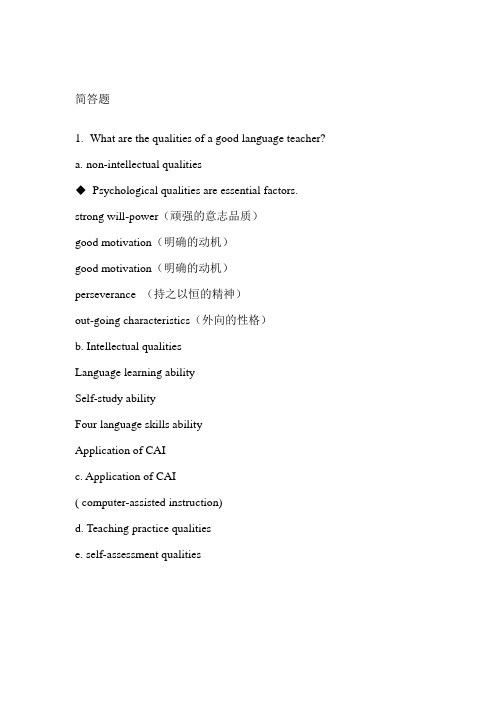
简答题1.What are the qualities of a good language teacher?a.non-intellectual qualitiesPsychological qualities are essential factors. strong will-power(顽强的意志品质)good motivation(明确的动机)good motivation(明确的动机)perseverance (持之以恒的精神)out-going characteristics(外向的性格)b. Intellectual qualitiesLanguage learning abilitySelf-study abilityFour language skills abilityApplication of CAIc. Application of CAI( computer-assisted instruction)d. Teaching practice qualitiese. self-assessment qualities2.What are the difference between linguistic competence andcommunicative competence? What is communicative competence? 1)2)It covers a variety of development in syllabus design and in themethodology of foreign language teaching and includes both knowledge about how to use the language appropriately in communicative situation.3. What is deductive method of teaching grammar? What is inductive method of teaching grammar?1)Deductive method: it refers on reasoning, analysing and comparison.First ,the teacher write an example on board or draws attention to an example in the textbook. Then the teacher explains the underlying rules regarding the forms and positions of certain structural word.2)Inductive method: in the inductive method ,the teacher provideslearners with authentic language data and induces the learners to realise grammar rules without any form of explicit explanation. It is believed that the rules will become evident if the students are given enough appropriate examples.3.What are the principles for good lesson planning?1)Variety:Planning a number of different types of activities and where possible introducing students to a wide selection of materials so that learning isalways interesting, motivating and never monotonous for the students. 2)Flexibility:Planning to use a number of different methods and techniques rather than being a slave to one methodology. This will make teaching and learning more effective and more efficient.3)Linkage:The stages and the steps within each stage are planned in such a way that they are somehow linked with one another. Language learning needs recycling and reinforcement.4)Learnability:The contents and tasks planned for the lesson should be within the learning capability of the students. Of course, things should not be too easy either. Doing things that are beyond or below the students’coping ability will diminish their motivation.4.What are the difference between macro planning and micro planning?Ideally, lesson planning should be done ay two levels: macro planning and micro planning. The former is planning over time, for instance, the planning for a month,a term, or the whole course. The latter is planning for a specific lesson, which usually lasts 40 or 50 minutes. Of course, there is no clear cut difference between these two types of planning. Micro planning should be based on macro planning, and macro planning is apt to be modified as lessons go on.5.What are the components of a lesson plan?1)Teaching aims:The first thing to do in lesson planning is to decide theaims of a lesson, which include what language components to present, what communicative skills to practise, what activities to conduct and what materials and teaching aids to be used.2)Language contents and skills:language contents: structures (grammar),vocabulary,functions,topics and so on. Language skills: communicative skills involved in listening, speaking reading and writing3)Teaching stages and procedures:Teaching stages are the major stepsthat language teachers go through in the classroom.Procedures are the detailed steps in each teaching stage.The most popular language teaching stages are the three P’s model, which include presentation, practice and production.6.What are the aspects of pronunciation?Pronunciation is an umbrella term covering mang aspects besides sound and phonetic symbols, such as stress, intonation, and rhythm.7.What are the principles for teaching listening?①Focus on process②Combine listening with other skills③Focus on the comprehension of meaning④Grade difficulty level appropriately8.What are the purposes for pre-listening, while-listening andpost-listening activities?1)Pre-listening:To spark interest and motivate students to attend to thespoken message,To activate or build students' prior topical and linguistic knowledge,To set purposes for listening.2)While-Listening: To foster students' comprehension of the speaker'slanguage and ideas, To focus students' attention on such things as the speaker's organizational patterns, To encourage students' critical reactions and personal responses to the speaker's ideas and use of language.3)Post-listening: To examine relationships between prior knowledgeand experience, and new ideas and information gained from the speaker or discussion ,To invite and encourage student reflection and response,To clarify and extend comprehension beyond the literal level to the interpretive and critical levels.9.Can you name some types of speaking activities?①Controlled activities: it mainly focuses on form and accuracy.②Semi-controlled activities: it focuses on more on meaning and communication.③Communicative activities: it allows for real information exchange.10.W hat is the bottom-up model of teaching reading?11.W hat is the top-down model of teaching reading?12.W hat are the purposes of pre-reading activities?To interest and motivate studentsTo activate students’prior knowledge13.W hat is the process approach to writing?14.W hat is the interrelationship between listening and speaking? What isthe interrelationship between reading and writing?15.W hy should we integrate the four skills? What is skills integration?a.Skills integration generally refers to linking two or more of thetraditional four skills of language learning: reading, writing, listening, and speaking.There are many situations in which we use more than one language skill .b.An integrating approach for the development of communicative skillsin the classroom, in which the four skills in the acquisition of knowledge of a foreign language can be taught in a coherent way, and practiced together.16.W hat are the conditions for language learning according to JaneWillis’Framework for Task-Based Leaning? What are the essential conditions and what is the desirable condition?a.Essential and desirableb.Essential: 1.Exposure to a rich but comprehensible input of realspoken and written language in use e of the language to do things3 Motivation to listen to and read the language and to speak and write itC . Desirable: instruction in language (i.e. chances to focus on form)17.W hat are the means to integrate the four skills in teaching?①Simple integration②Complex integration18.W hat are the methods of assessment?Positive assessment;neglect assessment;teacher’s assessment;continuous assessment;Ss’self-assessment;portfolios (个人成长档案)19.W hat are the criteria for assessment?1.Criterion-referenced assessment2.Norm-referenced assessment3.Individual-referenced assessment20.W hat are the features of good textbooks?21.W hat are the methods of adapting textbooks? What are the 8 optionsin adapting textbooks?。
learnability名词解释

learnability名词解释Learnability,即学习性,是一个用于描述事物、概念或技能能否被有效地学习和掌握的概念。
这个概念广泛应用于教育、心理学和人机交互等领域,对于评估和优化学习过程以及提高学习效果具有重要意义。
一、学习性的概念学习性指的是一个事物、概念或技能是否可以通过学习来掌握和应用。
它强调了学习过程对于人类的重要性,以及人们在学习过程中的能力和潜力。
学习性不仅仅关注特定知识的掌握程度,更重要的是指一个人是否具备学习新事物的能力和灵活应用已学知识的能力。
二、学习性的影响因素学习性的评估和影响因素非常多样化,下面介绍几个主要因素:1. 背景和经验:学习性受到个人背景和经验的影响。
个体的学习能力受到既往经验和知识的影响,有经验丰富的人在学习新事物时往往更具优势。
2. 渴望和动机:学习性还与个体的渴望和动机密切相关。
一个有目标和动力的人往往更容易积极主动地学习和尝试,从而提高学习性。
3. 学习环境:学习性受到学习环境的影响。
一个积极鼓励和支持学习的环境有助于提高学习性,例如良好的师生关系、充满挑战的学习任务等。
4. 学习策略和方法:学习性还与个体的学习策略和方法选择有关。
合理的学习策略和方法能够提高学习效果,进而提高学习性。
三、学习性的重要性学习性对于个人和社会发展都具有重要意义,具体体现在以下几个方面:1. 个人发展:学习性决定了个体对新知识和新技能的吸收和应用能力。
一个具有良好学习性的人能够持续学习和适应不同环境的变化,提高自身的竞争力和发展潜力。
2. 教育优化:评估和培养学习性有助于优化教育过程。
教育者可以通过了解学习者的学习能力和学习特点,采用合适的教学策略和方法,促进学生的学习进步。
3. 技术创新:学习性对于技术创新和人机交互设计起到重要推动作用。
优化技术的学习性能够提高用户对新技术的接受度和应用效果,推动技术的快速普及和应用。
四、如何提高学习性为了提高个体的学习性,我们可以采取以下几种方法:1. 多样化学习经验:通过积极参与各种不同的学习经验,例如参加不同领域的培训、实践项目等,拓宽自己的知识面和学习能力。
优秀语言学习者的学习策略Good language learner (GLL)
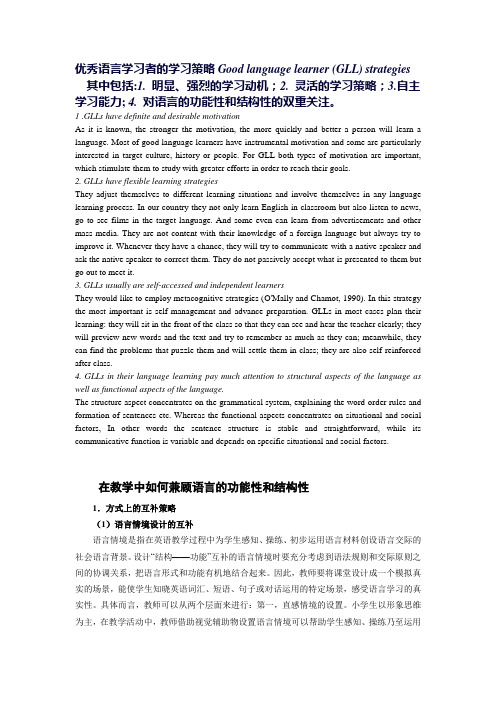
优秀语言学习者的学习策略Good language learner (GLL) strategies 其中包括:1.明显、强烈的学习动机;2.灵活的学习策略;3.自主学习能力; 4.对语言的功能性和结构性的双重关注。
1 .GLLs have definite and desirable motivationAs it is known, the stronger the motivation, the more quickly and better a person will learn a language. Most of good language learners have instrumental motivation and some are particularly interested in target culture, history or people. For GLL both types of motivation are important, which stimulate them to study with greater efforts in order to reach their goals.2. GLLs have flexible learning strategiesThey adjust themselves to different learning situations and involve themselves in any language learning process. In our country they not only learn English in classroom but also listen to news, go to see films in the target language. And some even can learn from advertisements and other mass media. They are not content with their knowledge of a foreign language but always try to improve it. Whenever they have a chance, they will try to communicate with a native speaker and ask the native speaker to correct them. They do not passively accept what is presented to them but go out to meet it.3. GLLs usually are self-accessed and independent learnersThey would like to employ metacognitive strategies (O'Mally and Chamot, 1990). In this strategy the most important is self-management and advance preparation. GLLs in most cases plan their learning: they will sit in the front of the class so that they can see and hear the teacher clearly; they will preview new words and the text and try to remember as much as they can; meanwhile, they can find the problems that puzzle them and will settle them in class; they are also self-reinforced after class.4. GLLs in their language learning pay much attention to structural aspects of the language as well as functional aspects of the language.The structure aspect concentrates on the grammatical system, explaining the word-order rules and formation of sentences etc. Whereas the functional aspects concentrates on situational and social factors, In other words the sentence structure is stable and straightforward, while its communicative function is variable and depends on specific situational and social factors.在教学中如何兼顾语言的功能性和结构性1.方式上的互补策略(1)语言情境设计的互补语言情境是指在英语教学过程中为学生感知、操练、初步运用语言材料创设语言交际的社会语言背景。
如何成为一个好的语言学者英文作文

如何成为一个好的语言学者英文作文How to Become a Good LinguistLanguage is a fascinating subject that is central to human communication and culture. Linguists study the structure, usage, and evolution of languages, and play a crucial role in preserving linguistic diversity and understanding the complexities of human communication. If you have a passion for languages and want to become a good linguist, here are some steps you can take to achieve your goal.1. Develop a love for languagesTo become a good linguist, you need to have a genuine love for languages. This can involve learning multiple languages, exploring different language families, and immersing yourself in the linguistics of various cultures. By appreciating the beauty and diversity of languages, you will be motivated to delve deeper into the field of linguistics.2. Study linguisticsFormal education in linguistics is essential for becoming a good linguist. You can pursue a degree in linguistics or a related field such as cognitive science, anthropology, or psychology. During your studies, you will learn about phonetics, syntax,semantics, morphology, and other branches of linguistics. You will also gain expertise in analyzing language data and conducting research in the field.3. Learn multiple languagesTo excel in linguistics, it is beneficial to have proficiency in multiple languages. This will give you a broader perspective on language structures and enable you to conduct comparative analyses across different languages. By learning different languages, you will also enhance your communication skills and cultural understanding.4. Read widelyAs a linguist, it is important to stay informed about the latest developments in the field. Reading academic journals, books, and articles related to linguistics will help you stay updated on current research and theories. You can also explore topics such as sociolinguistics, psycholinguistics, historical linguistics, and computational linguistics to broaden your knowledge base.5. Conduct researchResearch is a fundamental aspect of linguistics, and conducting your own research projects will help you develop critical thinking and analytical skills. You can explore topics suchas language acquisition, language change, dialect variation, and language documentation. By designing and carrying out research studies, you will make valuable contributions to the field of linguistics.6. Attend conferences and workshopsNetworking with other linguists and scholars is essential for professional growth in the field of linguistics. Attending conferences, workshops, and seminars will provide you with opportunities to present your research, collaborate with colleagues, and learn from experts in the field. By engaging with the broader linguistics community, you will expand your knowledge and skills.7. Collaborate with othersCollaboration is key to success in linguistics, as language is a complex and multifaceted phenomenon that requires interdisciplinary approaches. By working with experts in other fields such as psychology, computer science, or anthropology, you can gain new perspectives and insights that will enhance your research and broaden your expertise.8. Stay curious and open-mindedTo become a good linguist, it is essential to maintain a sense of curiosity and open-mindedness about language and its complexity. By staying curious, you will continue to explore new ideas and theories in linguistics, while remaining open-minded will enable you to consider diverse perspectives and approaches to language study.In conclusion, becoming a good linguist requires a combination of passion, education, research, and collaboration. By following these steps and staying dedicated to your linguistic pursuits, you can make valuable contributions to the field of linguistics and deepen your understanding of language and human communication.。
语言能力的好处和如何提高能力的英语作文

语言能力的好处和如何提高能力的英语作文The Benefits of Language Proficiency and How to Improve Language SkillsLanguage proficiency is a valuable skill that can benefit individuals in various aspects of their lives. Whether it's for communication, career advancement, or personal development, the ability to speak multiple languages can open up many doors. In this essay, we will explore the benefits of language proficiency and provide some tips on how to improve language skills effectively.First and foremost, being proficient in multiple languages can greatly enhance communication abilities. In today's globalized world, knowing more than one language can help individuals connect with people from different cultures and backgrounds. It allows for better understanding and deeper relationships with others, ultimately fostering empathy and cultural awareness. Furthermore, language proficiency can also facilitate travel and exploration, as it enables individuals to navigate foreign countries with ease and confidence.Moreover, language proficiency can also boost career prospects. Many employers value candidates who are fluent inmultiple languages, as it demonstrates strong communication skills and adaptability. In fields such as business, international relations, and tourism, being multilingual can give individuals a competitive edge and open up opportunities for career advancement. Additionally, language proficiency can also increase job prospects in industries that require intercultural communication, such as translation, interpretation, and diplomacy.In addition to the practical benefits, language proficiency can also have cognitive advantages. Research has shown that learning a new language can improve brain function, enhance memory retention, and increase cognitive flexibility. It challenges the brain to think in new ways and helps individuals develop problem-solving skills and creativity. Furthermore, being bilingual or multilingual has been linked to a reduced risk of cognitive decline and dementia in older age, highlighting the long-term cognitive benefits of language proficiency.Now that we've discussed the benefits of language proficiency, let's explore some tips on how to improve language skills effectively. One of the most important aspects of language learning is consistent practice. Just like any skill, language proficiency requires regular practice and exposure to thelanguage. This can be achieved through various methods, such as language classes, online courses, language exchange programs, and immersion experiences.Another effective way to improve language skills is through cultural immersion. This involves fully immersing oneself in the language and culture of the target language, whether through travel, living abroad, or engaging with native speakers. Immersion experiences provide a real-world context for language learning and help individuals develop fluency and confidence in their language skills.Additionally, incorporating language learning into daily routines can also be beneficial. This can be done through activities such as reading books, watching films, listening to music, and practicing conversation with native speakers. By integrating language learning into everyday life, individuals can maintain motivation and make steady progress in improving their language skills.In conclusion, language proficiency offers a wide range of benefits, from improved communication abilities to enhanced career prospects and cognitive advantages. By following the tips outlined in this essay, individuals can effectively improve their language skills and unlock the numerous opportunities thatcome with being multilingual. So start learning a new language today and reap the many rewards that language proficiency has to offer!。
语言学习的价值英语作文150字
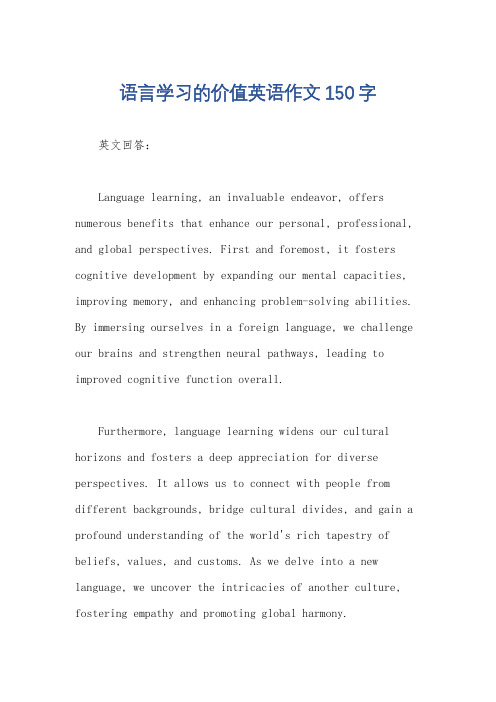
语言学习的价值英语作文150字英文回答:Language learning, an invaluable endeavor, offers numerous benefits that enhance our personal, professional, and global perspectives. First and foremost, it fosters cognitive development by expanding our mental capacities, improving memory, and enhancing problem-solving abilities. By immersing ourselves in a foreign language, we challenge our brains and strengthen neural pathways, leading to improved cognitive function overall.Furthermore, language learning widens our cultural horizons and fosters a deep appreciation for diverse perspectives. It allows us to connect with people from different backgrounds, bridge cultural divides, and gain a profound understanding of the world's rich tapestry of beliefs, values, and customs. As we delve into a new language, we uncover the intricacies of another culture, fostering empathy and promoting global harmony.Professionally, language proficiency opens doors to countless opportunities. In today's interconnected world, employers value individuals with cross-cultural communication skills. Language learning empowers us to engage with clients, colleagues, and partners from around the globe, fostering effective collaboration and breaking down communication barriers. It also enhances our competitiveness in the job market, providing a distinctive edge over monolingual candidates.Beyond the practical benefits, language learning enriches our lives in profound ways. It ignites a lifelong passion for exploration and discovery, expanding our knowledge and fostering a sense of accomplishment. It provides a unique lens through which to appreciate literature, film, and music, enhancing our cultural experiences and deepening our understanding of the human condition.In essence, language learning is an investment in our cognitive, cultural, professional, and personal growth. Itis a journey that empowers us to connect with the world, embrace diversity, and explore the boundless possibilities that lie beyond our native tongue.中文回答:语言学习是一项无价的努力,它为我们提供了许多好处,这些好处可以提升我们的个人、职业和全球视野。
learner language名词解释
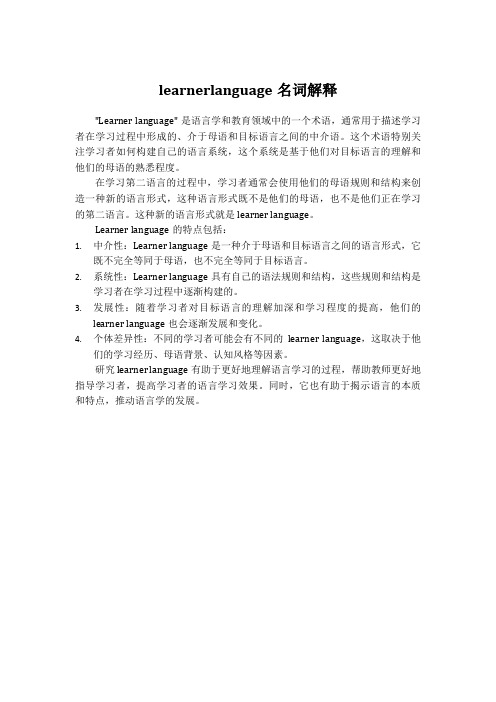
learnerlanguage名词解释
"Learner language" 是语言学和教育领域中的一个术语,通常用于描述学习者在学习过程中形成的、介于母语和目标语言之间的中介语。
这个术语特别关注学习者如何构建自己的语言系统,这个系统是基于他们对目标语言的理解和他们的母语的熟悉程度。
在学习第二语言的过程中,学习者通常会使用他们的母语规则和结构来创造一种新的语言形式,这种语言形式既不是他们的母语,也不是他们正在学习的第二语言。
这种新的语言形式就是learner language。
Learner language的特点包括:
1.中介性:Learner language是一种介于母语和目标语言之间的语言形式,它
既不完全等同于母语,也不完全等同于目标语言。
2.系统性:Learner language具有自己的语法规则和结构,这些规则和结构是
学习者在学习过程中逐渐构建的。
3.发展性:随着学习者对目标语言的理解加深和学习程度的提高,他们的
learner language也会逐渐发展和变化。
4.个体差异性:不同的学习者可能会有不同的learner language,这取决于他
们的学习经历、母语背景、认知风格等因素。
研究learner language有助于更好地理解语言学习的过程,帮助教师更好地指导学习者,提高学习者的语言学习效果。
同时,它也有助于揭示语言的本质和特点,推动语言学的发展。
语言学习的价值英语作文
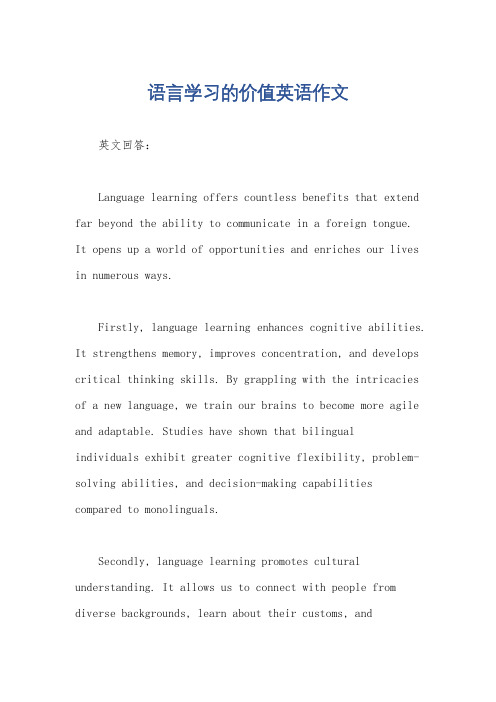
语言学习的价值英语作文英文回答:Language learning offers countless benefits that extend far beyond the ability to communicate in a foreign tongue.It opens up a world of opportunities and enriches our lives in numerous ways.Firstly, language learning enhances cognitive abilities. It strengthens memory, improves concentration, and develops critical thinking skills. By grappling with the intricacies of a new language, we train our brains to become more agile and adaptable. Studies have shown that bilingualindividuals exhibit greater cognitive flexibility, problem-solving abilities, and decision-making capabilities compared to monolinguals.Secondly, language learning promotes cultural understanding. It allows us to connect with people from diverse backgrounds, learn about their customs, andappreciate different perspectives. Through language, we can delve into foreign films, literature, and music, gaining insights into the thoughts, feelings, and experiences of other cultures. This fosters tolerance, empathy, and a global mindset.Thirdly, language learning expands career prospects. In today's interconnected world, fluency in foreign languages is a highly sought-after skill in countless industries. Employers value candidates with the ability to communicate effectively with clients, partners, and colleagues from around the globe. Language proficiency can lead to higher salaries, promotions, and more fulfilling work experiences.Moreover, language learning enhances personal growth.It challenges us to step outside of our comfort zones, embrace new experiences, and develop a sense of accomplishment. The process of learning a new language requires patience, perseverance, and resilience, qualities that can benefit us in all aspects of life.In summary, language learning is an invaluableinvestment that empowers us with enhanced cognitive abilities, promotes cultural understanding, expands career prospects, and fosters personal growth. It unlocks a worldof possibilities and enriches our lives in profound ways.By embracing the challenge of language learning, we notonly gain the ability to communicate with others but also cultivate a more open-minded, adaptable, and successful self.中文回答:语言学习的价值在沟通能力之外,还为我们打开了无数扇希望之门,从多个方面充实着我们的生活。
如何成为一个优秀的语言学者,英语作文

如何成为一个优秀的语言学者,英语作文How to Become an Excellent LinguistIntroductionLanguage is a fundamental aspect of human communication and culture, and those who study it are known as linguists. Becoming an excellent linguist requires dedication, hard work, and passion for languages. In this article, we will explore the steps you can take to become a top-notch linguist.Step 1: Develop a Passion for LanguagesThe first step in becoming an excellent linguist is to cultivate a genuine love for languages. This includes not only learning new languages but also studying the structure, history, and evolution of languages. Linguists are curious about how languages work and are constantly seeking to expand their understanding of different linguistic systems.To develop a passion for languages, immerse yourself in different languages and cultures by traveling, reading literature in foreign languages, and watching foreign films. Make an effort to learn at least one new language fluently, as this will deepen your understanding of linguistic structures and improve your language learning skills.Step 2: Pursue a Formal Education in LinguisticsWhile you can study languages independently, pursuing a formal education in linguistics will provide you with a solid foundation in linguistic theory and research methods. Look for universities or colleges that offer linguistics programs and consider majoring in linguistics or a related field such as cognitive science, anthropology, or psychology.During your studies, take a variety of courses in phonetics, syntax, semantics, historical linguistics, and sociolinguistics to develop a well-rounded understanding of language. Seek out opportunities to conduct research or participate in linguistic fieldwork to gain hands-on experience in the field.Step 3: Practice Critical Thinking and Analytical SkillsAn essential skill for linguists is the ability to think critically and analytically about language. Linguists analyze language structures, identify patterns and rules, and draw conclusions based on evidence. To hone your critical thinking skills, engage in exercises that involve problem-solving, logical reasoning, and data analysis.Practice dissecting sentences, identifying grammatical structures, and analyzing language data to improve youranalytical skills. Participate in linguistic puzzles and challenges to stretch your mental faculties and sharpen your linguistic intuition.Step 4: Stay Current with Linguistic ResearchThe field of linguistics is constantly evolving, with new research findings and theoretical frameworks emerging regularly. To stay at the forefront of linguistic knowledge, read academic journals, attend conferences, and follow leading linguists on social media. Keep abreast of the latest developments in the field and engage with current debates and controversies in linguistics.Engage actively in discussions with other linguists, ask questions, and share your own insights. By staying current with linguistic research, you will deepen your understanding of language and contribute to the advancement of linguistic knowledge.Step 5: Engage with Diverse Language CommunitiesTo become an excellent linguist, it is essential to engage with diverse language communities and learn from native speakers. Participate in language exchange programs, volunteer as a language tutor, or collaborate with speakers of lesser-studied languages to gain hands-on experience with linguistic diversity.Immerse yourself in different language environments, interact with speakers of various dialects and registers, and observe language use in different contexts. By engaging with diverse language communities, you will broaden your linguistic knowledge, develop cultural sensitivity, and gain valuable insights into the complexities of human communication.ConclusionBecoming an excellent linguist requires dedication, hard work, and a genuine passion for languages. By cultivating a love for languages, pursuing a formal education in linguistics, practicing critical thinking and analytical skills, staying current with linguistic research, and engaging with diverse language communities, you can become a top-notch linguist. Remember that language is a dynamic and multifaceted phenomenon, and there is always more to learn and discover in the field of linguistics. Enjoy the journey of becoming an excellent linguist and explore the rich tapestry of human language.。
- 1、下载文档前请自行甄别文档内容的完整性,平台不提供额外的编辑、内容补充、找答案等附加服务。
- 2、"仅部分预览"的文档,不可在线预览部分如存在完整性等问题,可反馈申请退款(可完整预览的文档不适用该条件!)。
- 3、如文档侵犯您的权益,请联系客服反馈,我们会尽快为您处理(人工客服工作时间:9:00-18:30)。
Page 16
Learnability Models
Two information presentation methods
Text: each it is a string of and it=. In fact it is a function and three classes of texts based on the type of functions are
If no: all bets are off
Page 7
Motivations
Q: Why study the inductive inference “in the limit”
“in the limit” = at time It‟s unlikely to get answers to the question “given the information and a set of possible conclusions, at specific time t what are the correct conclusion? The „power‟ question: the behavior of a learner in the limit
Page 8
Learnability Models
A learnability model consists of
A definition of learnability: what do you mean by saying that a language is learned? A method of information presentation: how does an instructor teach the learner? A naming relation which assigns names to languages: what is the result of the learning?
A string can be encoded into a single integer i.e., we can always have a A* function
Page 11
Learnability models
Definitions of learnability
A method of information presentation
Q: How to model natural languages in artificial systems?
Lower bound: rich enough to simulate the linguistic phenomena Upper bound: a training procedure exists
Page 5
Motivations
properly inclusive Language Non-computable Recursively enumerable (RE) Recursive Context-sensitive Context-free Context-sensitive grammar Context-free grammar Regular expressions Unrestricted Grammar ?? Turing machines Turing machines that always halt Linear-bounded automata Non-deterministic pushdown automata Finite state automata 1 2 0 Machine Chomsky Hierarchy
Q: What are the implications to cognitive systems brought by the artificial models?
Page 4
Motivations
Toward a guages
Step 0: Power of different classes of formal languages (naï ve models) Step 1: Learnability/identifiability of the formal languages Step 2: Complex models for real-life linguistic phenomena Step 3: Learnability of the complex models
A naming relation
Learnability Models
Method of information presentation
For a language , I() is its set of allowable information sequences (each one has infinite length) For a language : i1, i2, …, it is a prefix of some sequence in I()
Page 9
Learnability Models
Basic concepts
Alphabet A is a non-empty finite set of symbols; A* is the (inifinite) set of all finite strings over A Language is a subset of A*; a language class is the set of languages of the same underlying machine (some language is non-computable
Empirical Studies: Bohannon & Stanowicz‟s Experiment on Adult Feedback, and Gordon‟s Attack
Page 2
Gold‟s “Identification in the Limit” (1967)
Motivations
Language Learnability
Outline
Gold‟s “Identification in the Limit” (1967)
Learnability models
Results and implications
Proof sketches Learning time
Page 13
Learnability Models
Three learnability definitions
Identification in the limit t (t is finite) gt = gt+1=…= g is correct Finite identification h(i1, i2, …, it) is a decision function returning 0/1; g = G(i1, i2, …, it) iff h(i1, i2, …, it)=1
Page 18
Learnability models
Definitions of learnability
A method of information presentation
A naming relation
Learnability Models
A naming relation consists of a set of names N and a function f:N
Arbitrary: arbitrary functions
Methodical: it is the i-th string in A* Request: it is requested by the learner (or equivalently it is defined by the learner)
because 2A* is uncountable but the set of all possible TMs is countable)
Time t is discrete (t=1, 2, …)
Page 10
Learnability Models
Basic concepts
A primitive recursive function is
Regular
3
Page 6
Motivations
Q: Is human mind a Turing machine?
If yes
what machines can‟t learn, human can‟t learn either, and vice versa Natural languages are recursive (unless humans have time-out or probabilistic reasoning capability?)
Fixed-time identification g = G(i1, i2, …, i) where is a constant
Page 14
Learnability models
Definitions of learnability
A method of information presentation
Page 17
Learnability Models
Informant : each it is a string together with a binary signal indicating if the string is in . Again it is a function and three classes of informants based on the type of functions are
